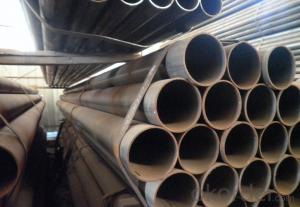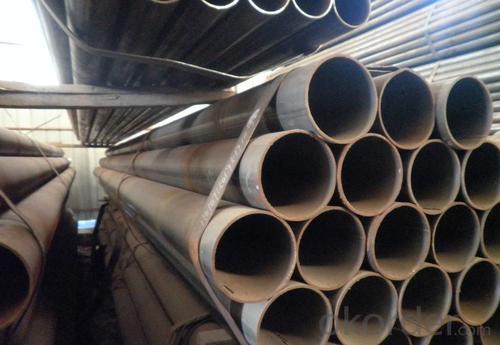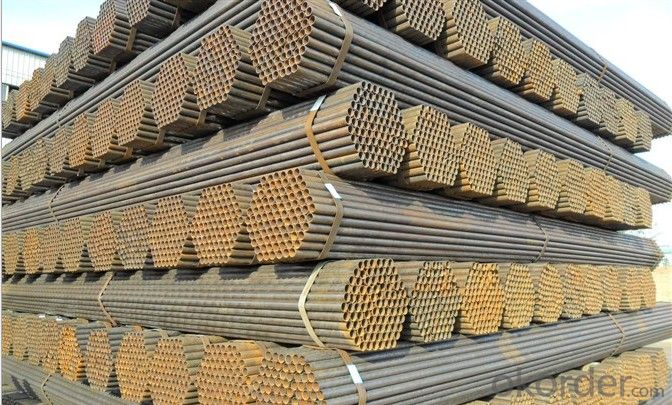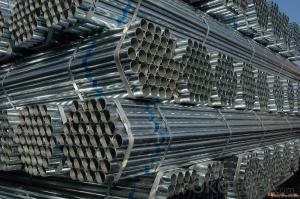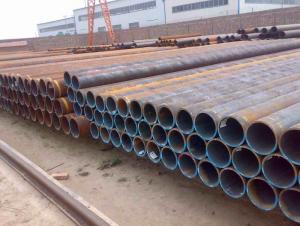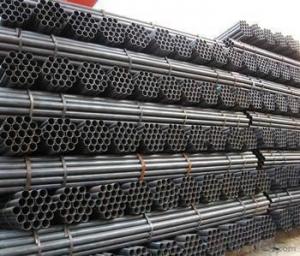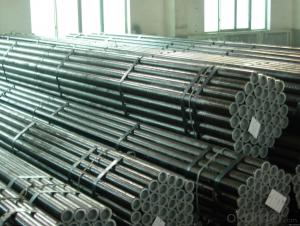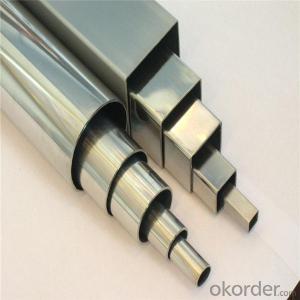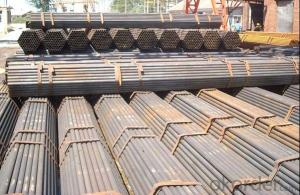Welded Black ERW Pipe IPS Oil and Water Pipe
- Loading Port:
- Tianjin
- Payment Terms:
- TT OR LC
- Min Order Qty:
- 30 m.t.
- Supply Capability:
- 6500 m.t./month
OKorder Service Pledge
OKorder Financial Service
You Might Also Like
1、Structure of Welded Black ERW Pipe IPS :
Welded Black ERW Pipe IPS is electric resistance welding, the abbreviation for ERW for transporting oil and natural gas vapor liquid objects, can meet the requirements of high and low pressure, the transport in the world with pipe sector accounted for a pivotal position.With sound reputation and high quality , we will offer clients a wonderful business experience.
2、Main Features of Welded Black ERW Pipe IPS :
• High manufacturing accuracy
• High strength
• Good visual effect
• Good view and appearance
• Good shape
• Reasonable price
• Small inertia resistance
• Strong heat dissipation ability
3、Welded Black ERW Pipe IPS Specification:
Standard | GB, DIN, ASTM ASTM A106-2006, ASTM A53-2007 |
Grade | 10#-45#, 16Mn 10#, 20#, 45#, 16Mn |
Thickness | 1 - 33 mm |
Section Shape | Round |
Outer Diameter | 21 - 610mm |
Place of Origin | Tianjin, China (Mainland) |
Secondary Or Not | Non-secondary |
Application | Hydraulic Pipe |
Technique | Cold Drawn |
Certification | API |
Surface Treatment | factory state or painted black |
Special Pipe | API Pipe |
Alloy Or Not | Non-alloy |
Length | 5-12M |
Outer Diameter | 21.3-610mm |
Grade | 20#, 45#, Q345, API J55, API K55, API L80, API N80, API P110, A53B |
Standard | ASME, ASTM |
1) Material:20#(ASTM A 106/A53 GRB.API5LGRB,GB),45#,16Mn,10#.
2) Specification range:OD:21.3-610mm,WT:6-70mm,length:6-12m or according to the requirement of clients.
3) Excutive standards:GB,ASME API5L.ASTM A 106/A53,Despite of the above standards,we can also supply seamless steel pipe with standard of DIN,JIS,and so on,and also develop new products according to the requirements of our clients!
4) Surface:black lacquered,varnish coating or galvanized.
5) Ends:Beveled or square cut,plastic capped,painted.
6) Packing:bundles wrapped with strong steel strip,seaworthy packing.
4、Packaging & Delivery
Packaging Details: | seaworthy package,bundles wrapped with strong steel strip |
Delivery Detail: | 15-30days after received 30%TT |
5、FAQ of Welded Black ERW Pipe IPS :
①How is the quality of your products?
Our products are manufactured strictly according to national and internaional standard, and we take a test
on every pipe before delivered out. If you want see our quality certifications and all kinds of testing report, please just ask us for it.
Guaranteed: If products’ quality don’t accord to discription as we give or the promise before you place order, we promise 100% refund.
②How about price?
Yes, we are factory and be able to give you lowest price below market one, and we have a policy that “ for saving time and absolutely honest business attitude, we quote as lowest as possible for any customer, and discount can be given according to quantity”,if you like bargain and factory price is not low enough as you think, just don’t waste your time.Please trust the quotation we would give you, it is professional one.
③Why should you chose us?
Chose happens because of quality, then price, We can give you both.Additionally, we can also offer professional products inquiry, products knowledge train(for agents), smooth goods delivery, exellent customer solution proposals.Our service formula: good quality+good price+good service=customer’s trust
SGS test is available, customer inspection before shipping is welcome, third party inspection is no problem.
6、 Welded Black ERW Pipe IPS Images:
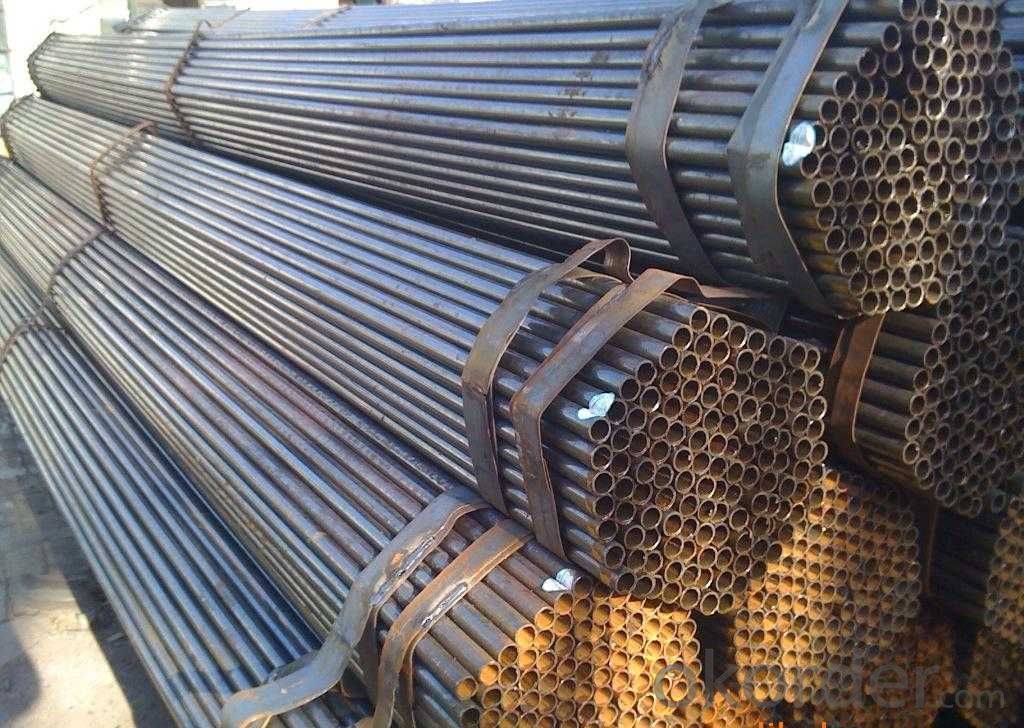
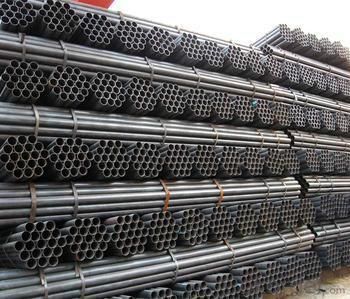
- Q: How are steel pipes used in the manufacturing of automobiles?
- Steel pipes are commonly used in the manufacturing of automobiles for various applications, such as exhaust systems, fuel lines, and structural components. The high strength and durability of steel pipes make them ideal for these purposes, ensuring the safety and reliability of automobiles.
- Q: How do you transport steel pipes safely?
- Steel pipes can be transported safely by properly securing them using appropriate restraints, such as straps or chains, to prevent shifting or movement during transit. Additionally, using suitable equipment and vehicles, such as flatbed trucks or trailers, with adequate support and cushioning, can help ensure the safe transportation of steel pipes. Regular inspections of the securing arrangements and adherence to relevant safety regulations are also crucial to maintain the safe transport of steel pipes.
- Q: What are the different sizes of steel pipes available?
- Steel pipes are available in a wide range of sizes, ranging from small diameters of around 0.5 inches to large diameters of up to 72 inches or more. The specific sizes of steel pipes vary depending on their intended use and application, with common sizes falling within the range of 1/8 inch to 36 inches in diameter.
- Q: What is the difference between steel pipe and PVC pipe?
- Steel pipe is made from a combination of iron and carbon, giving it strength and durability. It is used for heavy-duty applications, such as plumbing and gas lines, as it can withstand high pressure and extreme temperature. On the other hand, PVC (polyvinyl chloride) pipe is a plastic pipe that is lightweight, easy to install, and resistant to corrosion and chemicals. It is commonly used for plumbing, irrigation, and drainage systems, but not suitable for high-pressure applications.
- Q: What are the different types of threading on steel pipes?
- There are several different types of threading commonly used on steel pipes, including tapered, parallel, and buttress threading. Tapered threading is typically used for pipes that require a tight seal, as the threads gradually narrow towards the end of the pipe. Parallel threading, on the other hand, has threads that run parallel to the pipe's axis and is often used for pipes that need to be easily assembled and disassembled. Buttress threading is a combination of tapered and parallel threading, featuring one side with a tapered thread and the other side with a straight thread. This type of threading is often used for pipes that require both a secure connection and easy installation.
- Q: How do you calculate the maximum allowable deflection for steel pipes?
- To calculate the maximum allowable deflection for steel pipes, you need to consider various factors such as the pipe diameter, material properties, support conditions, and the desired level of deflection. The maximum allowable deflection is typically determined based on industry standards and codes. One commonly used method for calculating the maximum allowable deflection is based on the pipe's span-to-diameter ratio (L/D ratio). The L/D ratio is the ratio of the pipe's span (distance between supports) to its diameter. Several industry codes provide guidelines on the maximum allowable deflection based on the L/D ratio. For example, the American Society of Mechanical Engineers (ASME) B31.1 Power Piping Code suggests that for carbon steel pipes, the maximum allowable deflection should not exceed 3% of the pipe's span for an L/D ratio of 100 or less. However, for higher L/D ratios, the deflection limit decreases, ensuring the pipe's stability and structural integrity. To calculate the maximum allowable deflection using the L/D ratio method, you would first determine the L/D ratio based on the span and diameter of the pipe. Then, referring to the applicable code or standard, you can find the corresponding maximum allowable deflection limit. It is important to note that other factors such as the pipe material's yield strength, wall thickness, and the type of loading (e.g., dead load, live load) also influence the maximum allowable deflection. Therefore, it is crucial to consult the relevant industry standards, codes, and engineering principles to accurately calculate the maximum allowable deflection for steel pipes.
- Q: Are steel pipes suitable for underground installations?
- Yes, steel pipes are suitable for underground installations. Steel pipes have been widely used for underground applications due to their durability, strength, and resistance to corrosion. They are able to withstand high pressure and extreme temperature variations, making them ideal for transporting various substances such as water, gas, and oil underground. Additionally, steel pipes are highly resistant to environmental factors such as moisture and chemicals, which are commonly found in underground environments. With proper coatings and cathodic protection systems, steel pipes can have an extended lifespan and remain intact even in harsh underground conditions. Therefore, steel pipes are a reliable and suitable choice for underground installations.
- Q: What is the abrasion resistance of steel pipes?
- Steel pipes have a relatively high resistance to abrasion. They possess exceptional strength and durability, rendering them resilient against the detrimental effects of friction and impact. This quality positions steel pipes as a prime option for various industries and applications that frequently encounter abrasion, such as mining, oil and gas, and the transportation of abrasive substances. Furthermore, steel pipes can be fortified with coatings or linings to enhance their resistance against abrasion, tailored to meet the unique demands of each application. In conclusion, steel pipes present a dependable and enduring solution for effectively managing abrasive materials and environments.
- Q: Can steel pipes be used for LNG terminals?
- Yes, steel pipes can be used for LNG terminals. Steel pipes are commonly used in the construction of infrastructure for LNG terminals due to their strength, durability, and resistance to extreme temperatures. They can effectively handle the high-pressure requirements and the cryogenic temperatures involved in the storage and transportation of liquefied natural gas.
- Q: What are the different methods of wrapping steel pipes for corrosion protection?
- Corrosion protection for steel pipes can be achieved through various methods, tailored to specific applications and environmental conditions. Some commonly used techniques include: 1. Tape Wrapping: Steel pipes are wrapped with corrosion-resistant tape, like polyethylene or polypropylene tape, to create a barrier between the pipe and corrosive elements. This reduces the risk of direct contact and subsequent corrosion. 2. Inner Wrapping: A protective coating or lining is applied to the inside surface of the steel pipe. This method is commonly employed for pipes transporting fluids or gases, offering an additional layer of protection against internal corrosion. 3. External Coating: A widely utilized technique involves applying a protective coating to the outer surface of the steel pipe. This coating, which can consist of materials like epoxy, polyethylene, or polyurethane, acts as a barrier against corrosive elements, extending the pipe's lifespan. 4. Cathodic Protection: An electrochemical method is utilized to safeguard steel pipes from corrosion. By connecting the steel pipe to a sacrificial anode, such as zinc or magnesium, the anode corrodes instead of the pipe. This diverts corrosive currents away from the pipe, preventing its corrosion. 5. Heat Shrink Sleeve: Heat shrink sleeves are commonly employed for corrosion protection in underground or submerged scenarios. These sleeves, made of heat-activated material, shrink when heated to form a tight seal around the pipe. By preventing direct contact with moisture and corrosive elements, the sleeve effectively acts as a barrier. 6. Fusion Bonded Epoxy (FBE) Coating: FBE coating entails applying a thermosetting powder coating to the steel pipe's surface, which then fuses to create a protective layer. This coating exhibits strong adhesion and corrosion resistance, making it a popular choice for various steel pipe applications. Choosing the appropriate corrosion protection method for steel pipes depends on factors like the environment, specific corrosive elements, intended use, and other requirements. Seeking professional advice and consultation may be necessary to determine the most suitable technique for a particular situation.
Send your message to us
Welded Black ERW Pipe IPS Oil and Water Pipe
- Loading Port:
- Tianjin
- Payment Terms:
- TT OR LC
- Min Order Qty:
- 30 m.t.
- Supply Capability:
- 6500 m.t./month
OKorder Service Pledge
OKorder Financial Service
Similar products
Hot products
Hot Searches
Related keywords
